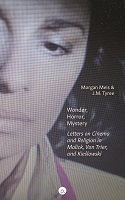Author success story
Context about the authors:
- Morgan Meis is a contributor at The New Yorker. He has a PhD in Philosophy and is a founding member of Flux Factory, an arts collective in New York. He has written for n+1, The Believer, Harper’s Magazine, and The Virginia Quarterly Review. He won the Whiting Award for nonfiction in 2013.
- J.M. Tyree is the author of BFI Film Classics: Salesman (British Film Institute/Bloomsbury), and the coauthor of Our Secret Life in the Movies (with Michael McGriff, A Strange Object/Deep Vellum), an NPR Best Books Selection. His writing on cinema has appeared in Sight & Sound, Film Quarterly, Film International, and Critical Quarterly. A former Keasbey Scholar in Religious Studies at Cambridge and a Stegner Fellow in the Creative Writing Program at Stanford, he currently serves as a Nonfiction Editor at New England Review and teaches as Distinguished Visiting Associate Professor at Virginia Commonwealth University.
Please provide some background information on the research project, book origin, adjacent research, and/or network enabling the book
The ‘research’ was many years of conversations, mostly via email, between Josh and Morgan around the subject of film and faith.
What was/were your motivation(s) for wanting to publish this book?
I love the film in a deeply personal way and felt that not much of the existing scholarship paid It became clear that our otherwise private conversation was perhaps something that would be thought-provoking to a broader audience, especially one interested both in film and the deeper questions of faith/meaning that great films can inspire.
Please give some information on the funding behind the research / book / network
This book was written in our spare time and the research for the book dovetailed with the work that Josh and Morgan were already doing as academics/writers.
Was the book made available on your own website, or the website of any other editors or contributors, or your institution? If so, please state which.
This book is available at the places where Josh and Morgan teach, VCU and CCS respectively.
Open access success story:
What makes this book successful?
The book is successful as an experiment in what a book can be. It is an email conversation. That’s it. But it works as a book, too. That’s cool.
Why did you choose to publish this book open access?
We were both ethically and intellectually sympathetic to the idea of open access. The book is the opening up of a private conversation into the public realm. It seemed right that this openness should be complete.
Do you think that open access publication helped the book and if so, why?
Yes. The book is an experiment. It is an email conversation published as a book. The open access helps people give this experimental book a chance.
Did your OA book show immediate success upon publication, or did the success unfold more slowly over time?
It is currently unfolding, but the response so far has been heartening.
If early signs of success started to show, did you try to reinforce this in an unusual or creative way?
Well, I am selling the book at the local artspace my spouse and I created in Detroit known as the Huckleberry Explorers Club Museum, General Store, and Gardens.
Did open access help to reach unreachable / unknown / unexpected / new audiences? If yes, how do you know this?
I don’t know.
Did open access make new connections / follow-up possible?
Again, we’re too early in the process for this to be happening yet.
Is there any long tail (awareness, citations, downloads) of this book that you consider would (most likely) not have happened with print sales only or toll-access?
It has likely been downloaded far more than anything else I have written.
How do you think academia can benefit from your book being OA?
Any curiosity around this book can be immediately satisfied. That’s the power of OA. Open. Access.
How do you think society at large can benefit from your book being OA?
Ditto

This article is made available under a Creative Commons Attribution 4.0 International License.

